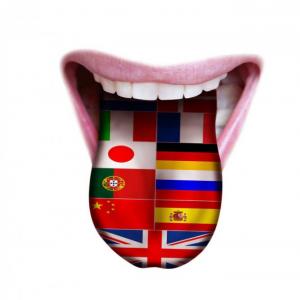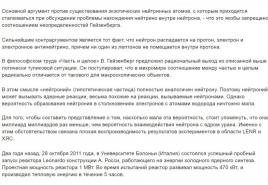3 words and their origins. Fascinating etymology or secrets of Russian words
The lexical stock of the Russian language is one of the largest in the world. It has been formed over the centuries under the influence of the development of social, economic and cultural life. The list of native Russian words is 90% of modern explanatory dictionaries... The rest consists of foreign borrowings that appeared both in the early stages of its development and in modern times.
In contact with
Stages of development of Russian vocabulary
Russian language, along with Ukrainian and Belarusian, is part of the East Slavic group of Indo-European language family... It began to form at the end of the Neolithic era and continues its development to this day.
There are several major stages in the development of the primordial vocabulary:

Words that appeared in our language at any of these stages are considered native Russian.
And also words of Russian origin include lexical units formed from those borrowed according to the rules of Russian word formation.
Scientists believe that at the end of the Neolithic era, there was a single Indo-European linguistic community. The speakers of the Indo-European language lived on a fairly large territory. Some researchers call this place of the earth from the Yenisei to the Volga. Their opponents talk about the resettlement of Indo-Europeans along the banks of the Danube and on the Balkan Peninsula. But they are all unanimous in the opinion that the Indo-European language gave rise to almost all European languages \u200b\u200band some Asian ones.
Common Indo-European words reflect specific phenomena and objects of the surrounding reality, degrees of kinship, numerals. Their spelling and pronunciation in many languages \u200b\u200bof the Indo-European family is almost identical. For example:

In East Slavic languages there are a lot of words common to Indo-European languages. These include nouns that denote:
- relationship degree: mother, brother, sister, daughter, son;
- natural phenomena: sun, moon, ice, rain, water;
- animals: wolf, goose, cow, bear;
- plants: oak, birch;
- metals: copper, bronze.
Words denoting numbers (two, three, four, five), properties of objects (new, white, fast), actions (sew, go) have Indo-European origin.
Common Slavic language
Around the 6th century BC e. the Proto-Slavic language appeared. Its bearers were Slavic tribes who settled in the territory between the rivers Dnieper, Vistula, Bug. Common Slavic vocabulary served as the basis for the development of the languages \u200b\u200bof the Western, Southern and Eastern Slavs. Common roots can be traced in them today.
The common Slavic primordial Russian vocabulary is diverse. Examples of nouns:

Among common Slavic words there are nouns that denote not concrete objects and phenomena, but abstract concepts. These include: will, guilt, faith, sin, thought, glory, happiness, goodness.
Compared with words of Indo-European origin, from the common Slavic vocabulary in our language there are more lexical units denoting actions, signs and qualities of objects.
- Actions: breathe, lie down, run, write, sow, reap, weave, spin.
- Signs and qualities of items: tall, fast, black, red, many, few, soon.
Common Slavicisms are distinguished by a simple structure. They consist of a stem and an ending. Moreover, the number of words derived from their stems is very large. With the root of glory, several dozen words have been formed: disgrace, glorify, glorify, glorious, glory, glorify.
 The meaning of some common Slavic words changed during the development of the language. The word "red" in the common Slavic vocabulary was used in the meaning of "beautiful, good". The modern meaning (color designation) has come into use since the 16th century.
The meaning of some common Slavic words changed during the development of the language. The word "red" in the common Slavic vocabulary was used in the meaning of "beautiful, good". The modern meaning (color designation) has come into use since the 16th century.
There are about two thousand general Slavisms in the lexical stock of Russian-speaking people. This relatively small group of primordial words forms the core of the Russian written and spoken language.
Old Russian or East Slavic stage of lexical development
In the 7th century AD, three separate groups of Slavic languages \u200b\u200bbegan to develop on the basis of common Slavic vocabulary: West Slavic, South Slavic and East Slavic languages. The East Slavic community of peoples became the basis of the Russian, Ukrainian and Belarusian nationalities. The tribes, which were carriers of a single East Slavic language, in the 9th century formed a single state - Kiev (Ancient) Russia. For this reason, the vocabulary that appeared between VII and XIV is called Old Russian vocabulary.
Old Russian lexical units formed under the influence of the political, economic, social and cultural development of a single East Slavic state. The original words of our language of this period refer to different parts speech and lexical-semantic groups.

Great Russian period of language formation
From the XIV century the Russian or Great Russian stage of the development of our vocabulary begins. It continues to this day. The beginning of the formation of the Great Russian vocabulary coincided with the formation of Russian statehood and the division for a long time in the development of the Russian, Ukrainian and Belarusian nationalities. Therefore, in the lexical stock of these languages, the same objects are designated by different words. For example: wallet - Ukrainian. Hamanian - Belarusian. sperm whale; palace - ukr. palace - Belarusian. palace; sparkle - ukr. libiskuvati - Belarusian. zihacets.
 Words that appeared during this period are characterized by a derivative stem. They appeared on the basis of well-known lexical units of Indo-European, Common Slavic and East Slavic origin. New word forms were formed on the basis of borrowings from foreign languages by adding simple stems.Such word forms are considered original. Actually Russian words make up a significant part of the Russian lexical stock.
Words that appeared during this period are characterized by a derivative stem. They appeared on the basis of well-known lexical units of Indo-European, Common Slavic and East Slavic origin. New word forms were formed on the basis of borrowings from foreign languages by adding simple stems.Such word forms are considered original. Actually Russian words make up a significant part of the Russian lexical stock.
Formation of new words in Russian
The lexical stock of our language quite intensively replenished. The basis for this process is the lexical units of the previous stages of language development and the borrowed vocabulary. This vocabulary changes and adapts to the needs of the language in accordance with the rules of word formation accepted in it.
Nouns
Adding to the borrowed base a specific Russian suffix -shchik, -chik, -vshchik, -lshchik, -lk, -ovk, -k, -tel, -ost. For example: from the word stone, which is of Indo-European origin, with the help of the suffix -shchik, the proper Russian noun mason was formed; from the word leaf, which appeared in the general Slavic period of the development of the Russian language, with the help of the suffix -ovk, the concept of leaflet arose.
 Adding native Russian prefixes to the base pri-, pa-, pra-, su-, v-, vo-, na-, ob-, pre-, re- and so on. For example: by adding a prefix to the common Slavic base city, the word suburb is added; adding the prefix o- to the same base, they get the noun garden.
Adding native Russian prefixes to the base pri-, pa-, pra-, su-, v-, vo-, na-, ob-, pre-, re- and so on. For example: by adding a prefix to the common Slavic base city, the word suburb is added; adding the prefix o- to the same base, they get the noun garden.
The formation of new words from two or more foundations: from the common Slavic foundations-truth- and -you- formed a complex russian word lover of truth; from the Indo-European basis of the mouse- and the common Slavic word to catch with the help of the suffix -k, the noun mouse was formed. Methods of forming verbs.
Ways to form verbs
One of the most common ways to form verbs is simultaneous addition of a prefix and a suffix to the stem... For example: from the common Slavic basis, running with the help of the prefix times and suffixes -at and -sya, the verb to run away appeared; from the common Slavic base -bogat- with the help of the prefix o- and suffixes -it and -sya, the original Russian word to enrich appeared.
 In the actual Russian period of vocabulary development, verbs derived from nouns are quite common. From the German word assault, borrowed in the 18th century, with the help of the -ova suffix, the verb assault was formed. With the help of the suffix -i, a verb to praise was formed from the common Slavic word glory.
In the actual Russian period of vocabulary development, verbs derived from nouns are quite common. From the German word assault, borrowed in the 18th century, with the help of the -ova suffix, the verb assault was formed. With the help of the suffix -i, a verb to praise was formed from the common Slavic word glory.
The Russian vocabulary is one of the most extensive and actively developing in the world. By borrowing vocabulary from other languages \u200b\u200band forming new words on its basis, the Russian language is replenished. Using the online dictionaries of the origin of words, you can learn more about the etymology of Russian vocabulary. In the age of globalization, knowledge of the origins of the Russian language and the stages of its development will preserve its originality and originality.
We don't often think about how the words we use came about and how their meanings might have changed over time. Meanwhile, words are quite living beings. New words appear literally every day. Some do not linger in the language, while others remain. Words, like people, have their own history, their own destiny. They can have relatives, a rich pedigree, and, on the contrary, be orphans. The word can tell us about their nationality, about their parents, about their origins. The study of the history of vocabulary and the origin of words is engaged in an interesting science - etymology.
Railway station
The word comes from the name of the place "Vauxhall" - a small park and entertainment center near London. The Russian Tsar, who visited this place, fell in love with it - especially the railway. Subsequently, he commissioned British engineers to build a small railway from St. Petersburg to his country residence. One of the stations on this section railroad was called "Vokzal", and this name later became the Russian word for any railway station.Bully
The word bully is of English origin. According to one of the versions, the surname Houlihan was once borne by a famous London brawler, which caused a lot of trouble for the city's residents and the police. The surname has become a household name, and the word international, characterizing a person who grossly violates public order.Orange
Until the 16th century, Europeans had no idea about oranges at all. Russians - even more so. Oranges don't grow here! And then Portuguese sailors brought these delicious orange balls from China. And they began to trade them with neighbors. In Dutch, "apple" is appel, and "Chinese" is sien. The word appelsien, borrowed from the Dutch language, is a translation of the French phrase Pomme de Chine - "apple from China".Doctor
It is known that in the old days they were treated with various conspiracies and spells. The ancient medicine man said to the patient something like this: "Go away, disease, into the quicksands, into the dense forests ..." And he muttered different words over the sick man. The word doctor is originally Slavic and is derived from the word "vrati", which means "to speak", "to speak." It is interesting that from the same word comes “to lie”, which for our ancestors also meant “to speak”. It turns out that in ancient times, doctors lied? Yes, only this word did not initially contain a negative meaning.Swindler
Ancient Russia did not know the Turkic word "pocket", because money was then carried in special purses - purses. From the word "purse" and produced "crook" - a specialist in theft from the scrotum.A restaurant
The word “restaurant” means in French “strengthening”. This name was given to one of the Parisian taverns by its visitors in the 18th century after the owner of the restaurant Boulanger introduced nutritious meat broth into the range of offered dishes.Shit
The word "shit" comes from the Proto-Slavic "govno", which means "cow" and was originally associated only with cow "cakes". "Beef" - "cattle", hence the "beef", "beef". By the way, from the same Indo-European root and english name the cows are a cow, and the shepherd of these cows is a cowboy. That is, the expression "fucking cowboy" is not accidental, it has a deep kinship.Heaven
One of the versions is that the Russian word "heaven" comes from "no, no" and "demon, demons" - literally a place free from evil / demons. However, another interpretation is probably closer to the truth. Most Slavic languages \u200b\u200bhave words that look like "sky", and they are most likely derived from the Latin word "cloud" (nebula).Slates
In the Soviet Union, the famous manufacturer of rubber slippers was the Polymer plant in the town of Slantsy, Leningrad Region. Many buyers assumed that the word "Slates" embossed on the soles was the name of the shoe. Further, the word entered the active vocabulary and became a synonym for the word "slippers".Nonsense
In the late 17th century, French physician Gali Mathieu treated his patients with jokes. He gained such popularity that he did not keep up with all the visits and sent his healing puns by mail. This is how the word "nonsense" arose, which at that time meant - a healing joke, a pun. The doctor immortalized his name, but now this concept has a completely different meaning.We do not often think about the origin of words, the change in their meaning over time. And words, by the way, are quite living beings. New words appear literally every day. Some of them do not stay in the language and are forgotten very quickly, others remain. The word, like a living person, can tell us about his nationality, about his parents and about his origin.
1. Train station
The word comes from the name of a small park and amusement center near London "Vauxhall". Once, Alexander I visited this place and fell in love with it so much that he instructed British engineers to build a small railway from St. Petersburg to his country residence. One of the stations on this section of the railway was named "Vokzal", and this name later became the Russian word for any sufficiently large railway station.
2. Bully

The word bully also has an English origin. According to the most common version, the surname Houlihan was borne by everyone in London by a famous brawler, who caused a lot of trouble for the police and residents of the city. The surname has become a household name, characterizing a person who grossly violates public order, and the word international.
3. Orange
Europeans knew nothing about oranges until the 16th century. Russians - and even longer. But Dutch sailors brought these sweet, juicy orange balls from China and began to trade them with their neighbors. Since there were no analogues of the name of this fruit in European languages, they began to call it “an apple from China.” In Dutch, “apple” is appel, and “Chinese” is sien, which makes it “orange”.
4. Doctor
In the old days, they were treated with various conspiracies and spells. The ancient sorcerer muttered different words over the sick and sometimes gave them decoctions of herbs. The word "doctor" is originally Slavic. It is formed from the word "virati", which means "to speak", "to speak." By the way, from the same word comes “to lie”, which for our ancestors also meant “to speak”.
5. Fraudster
IN Ancient Rus money was carried in special wallets - purses. From the word "purse" and produced "swindler" - "specialist" in thefts from the scrotum.
6. Restaurant
The word “restaurant” in French means “strengthening”. This was the name given to one of the Parisian taverns in the 18th century by its visitors after the owner of the establishment Boulanger introduced nutritious meat broth into the range of offered dishes.
7. Shit
"Shit" - from the Proto-Slavic "govno", which means "cow". Initially, it was associated only with cow "cakes". "Beef" - "cattle", hence the "beef", "beef". By the way, from the same Indo-European root and the English name of the cow - cow, and, accordingly, the shepherd of these cows - cowboy, and the popular American expression "fucking cowboy" is not accidental, but contains a deep kinship of the words that form it.
8. Heaven
One of the versions says that the Russian word "heaven" comes from "no, no" and "demon, demons" - literally a place free from evil / demons. But there is another interpretation, probably closer to the truth. Most Slavic languages \u200b\u200bhave words that sound like "heaven", and they most likely originated from the Latin word "cloud" (nebula).
9. Slates
The only manufacturer of rubber slippers in the Soviet Union was the Polymer plant, located in the town of Slantsy, Leningrad Region. Many buyers thought that the word "Slates" embossed on the soles was the name of the shoe. So it became a synonym for the word "slippers".
10. Rubbish
French physician Galy Mathieu treated his patients with jokes; having gained incredible popularity, he stopped having time to visit patients in person and sent his healing puns by mail. "Rubbish" came to mean - a healing joke, a pun.
At present, this concept has a completely different meaning, but after all, even at the end of the 17th century, hardly everyone was cured with the help of his jokes.
New words appear literally every day. Some do not linger in the language, while others remain. Words, like people, have their own history, their own destiny. They can have relatives, rich pedigree, and, on the contrary, be orphans. The word can tell us about its nationality, about its parents, about its origin ...
Railway station
The word comes from the name of the place "Vauxhall" - a small park and entertainment center near London. The Russian Tsar, who visited this place, fell in love with it - especially the railway. Subsequently, he instructed British engineers to build a small railway from St. Petersburg to his country residence. One of the stations on this section of the railway was named "Vokzal", and this name later became the Russian word for any railway station.
Bully
The word bully is of English origin. It is believed that the surname Houlihan was once borne by a famous London brawler, which caused a lot of trouble for the residents of the city and the police. The surname has become a household name, and the word is international, characterizing a person who grossly violates public order.
Orange
Until the 16th century, Europeans had no idea about Oranges at all. Russians - even more so. Oranges don't grow here! And then the Portuguese seafarers brought these delicious orange balls from the eastern countries. And they began to trade them with neighbors. Those, of course, asked: "Where did the apples come from?" - because they haven't heard of oranges, but in shape this fruit looks like an apple. The merchants answered honestly: "Apples from China, Chinese!" In Dutch, "apple" is appel, and Chinese is sien.
Doctor
In the old days, they were treated with conspiracies, spells, various whispers. An ancient healer, a sorcerer said to the patient something like this: "Go away, disease, into the quicksands, into the dense forests ..." And he muttered different words over the sick man. Do you know how up to early XIX century was called muttering, chatter? Mumbling, chatter was then called a lie. To mumble was to lie. He who trumpets is the trumpeter, who weaves is the weaver, and who lies is the doctor.
Swindler
In Russia, fraudsters were not called deceivers or thieves at all. This was the name of the masters who made the mosna, i.e. wallets.
Insect
The origin of the word animal is quite obvious: from belly - "life". But how to explain the strange name of the insect?
To answer this question, you do not need to be an entomologist, that is, a scientist studying insects, or a linguist. Suffice it to recall how these same insects look. Do you remember? Animals with "notches" on their bodies are insects. By the way, pure tracing paper from French insect - from Latin insectum "notched, with notches (animal)".
Here we will answer one more simple question, why insects are called boogers. Because the antennae of insects resemble goat horns. You cannot call them goats - they are too small, but boogers - just right. Remember, in Chukovsky: "Liquid-footed goat-bug" ...
Heaven
One of the versions is that the Russian word "heaven" comes from "no, no" and "demon, demons" - literally a place free from evil / demons. However, another interpretation is probably closer to the truth. Most Slavic languages \u200b\u200bhave words that look like "sky", and they are most likely derived from the Latin word "cloud" (nebula).
Slates
In the Soviet Union, the famous manufacturer of rubber slippers was the Polymer plant in the town of Slantsy, Leningrad Region. Many buyers assumed that the word "Slates" embossed on the soles was the name of the shoe. Further, the word entered the active vocabulary and became a synonym for the word "slippers".
The other day
Now the word the other day is almost a synonym for the word just now and means “recently, one of these days, but what days I don’t remember.
However, the other day comes from the Old Russian phrase onom dni ("this day", that is, "that day"), which was used as a completely accurate indication of the specific days that have already been discussed. Something like this: on February 2 and 3, someone met someone in the nearest forest, and on the same days, that is, these days, that is, the other day, this and that happened in Paris ...
In general, with the invention and distribution of calendars and chronometers, all these beautiful words are really out of date and have lost their true meaning. And their use is hardly justified now. If only for a word of mouth.
Nonsense
At the end of the last century, the French physician Gali Mathieu treated his patients with jokes. He gained such popularity that he did not keep up with all the visits and sent his healing puns by mail. This is how the word "nonsense" arose, which at that time meant - a healing joke, a pun.
The doctor immortalized his name, but now this concept has a completely different meaning.
Zakharov Vladimir
The Russian language is the soul of Russia, its shrine. Our fate is in the words we utter. That is why it is necessary to focus on the historical processes taking place in it; relying on the similarities between the Old Church Slavonic and the Russian language, to use the material of historical grammar to illustrate linguistic phenomena. The enrichment of the spiritual world of students is facilitated both by a comprehensive analysis of the text, which includes the key concepts of Orthodox culture: home, temple, family, duty, honor, love, humility, beauty, and work on the etymology of a single word.
Download:
Preview:
Fascinating etymology or secrets of Russian words
Student work
GBPOU RO PU No. 36 Zakharova Vladimir
Our spelling, being almost consistently etymological, gives it the richest food. It forces us to decompose words into their component parts, to look for related forms of L.V. Sherba. |
Introduction
The Russian language is the soul of Russia, its shrine. Our fate is in the words we utter. That is why it is necessary to focus on the historical processes taking place in it; relying on the similarities between the Old Church Slavonic and the Russian language, draw on the material of historical grammar to illustrate linguistic phenomena. The enrichment of the spiritual world of students is facilitated by both a comprehensive analysis of the text, which includes the key concepts of Orthodox culture: home, temple, family, duty, honor, love, humility, beauty, and work on the etymology of a single word.
1.Science etymology
Etymology - (Greek ἐ τ ῠ μολογ ί α "true meaning of the word")
The subject of etymology as a branch of linguistics is the study of sources and the process of forming the vocabulary of a language andreconstruction vocabulary of the language of the most ancient period (usually preliterate).
Semantics as a branch of linguistics answers the question of how a person, knowing the words and grammatical rules of a natural language, is able to convey with their help a wide variety of information about the world (including about his own inner world), even if he first encounters with such a task, and to understand what information about the world any statement addressed to him contains, even if he hears it for the first time.
IN vocabulary each language has a significant fund of words, the relationship of the form with the meaning is incomprehensible to native speakers, since the structure of a word cannot be explained on the basis of the models of word formation in the language. Historical changes in words obscure the original form and meaning of the word, andiconic the nature of the word determines the complexity of the reconstruction of the primary motivation, i.e. communication of the primary form and meaning of the word. The purpose of the etymological analysis of a word is to determine when, in which language, by whichderivational models, on the basis of what linguistic material, in what form and with what meaning the word arose, as well as what historical changes in its primary form and meaning determined the form and meaning known to the researcher.
Semantics emerged as an independent linguistic discipline relatively recently, at the end of the 19th century; the term "semantics" to denote a branch of science was first introduced in 1883 by the French linguist M. Breal, who was interested in the historical development of linguistic meanings. Until the end of the 1950s, along with it, the term “semasiology” was also widely used, nowadays preserved only as a not-so-common name for one of the sections of semantics. However, questions related to the conduct of semantics were posed and, in one way or another, solved already in the most ancient linguistic traditions known to us. Indeed, one of the main reasons forcing us to pay attention to the language is a lack of understanding of what an oral or written statement (text) addressed to us means or some part of it. Therefore, in the study of language, the interpretation of individual signs or entire texts - one of the most important types of activity in the field of semantics - has long played an important role. So, in China, in ancient times, dictionaries were created containing interpretations of hieroglyphs. In Europe, ancient and medieval philologists composed glosses, i.e. interpretation of obscure words in the monuments of writing. The really rapid development of linguistic semantics began in the 1960s; At present, it is one of the central in importance sections of the science of language.
In the European scientific tradition, the question of the relationship between words and "things", the objects to which they belonged, was first posed by ancient Greek philosophers, but to this day, various aspects of this relationship continue to be clarified. Consider the relation of the word to “things” more carefully.
2. The origin of words
Asphalt. I wonder what this Greek word meant when there were no paved sidewalks and highways. Let's open an ancient Greek dictionary. First syllableand - denial. Nounsphalma - fall, misfortune, failure. So the main meaning is bad. The prefix isand turns this word into its opposite, giving it a good quality.Asfaleia means: confidence, reliability, safety. That is the wordasphalt was named in Ancient greece resin of coniferous plants. From the resin and the name wentasphalt - tarred road.
Birch. From the word white in ancient times, the words "birch", "linen", "squirrel" occurred. Birch - a tree with white bark; white squirrel - a variety of squirrels of a very rare and expensive breed was named after the color of the fur; "linen from white" of the type "old from old" originally meant unpainted white linen, then linen from this linen, then linen in general.
Nonsense. When the first shipbuilders arrived in Russia under Peter I, they spoke mainly German, accompanying their words with intensified gestures, they explained the structure of the masts, their installation, their purpose, while saying hier und da, which in German meanshere and there . In Russian pronunciation and awareness, it turned intobullshit , which means something obscure and unnecessary.
Shabby dress. Everyday, home, everyday.At a meal in the last century, a cheap fabric was called - by the name of Zatrapeznova, at whose factory it was produced.
Clumsy . Some Russian writers can find the wordawkward
Okay, foldable: “Okay, awkward words come by themselves” (A. Kuprin). Writers use it from popular dialects. It comes from the ancient wordbastard - order, beauty.
Hence the beak and the quack - handsome, stately;clumsy - awkward, graceful.
It is impossible. What is not - it is clear, it is important to establish what islzya . It once soundedlz and was dative case from a nounof ice - freedom. Traces of the wordof ice we see in our modernbenefit, benefit ; it no longer occurs separately.
Education. It is believed that the word is a tracing-paper of German - a picture, an image, and the whole word means enlightenment. Wordeducation can be found in Russian church books already in the 17th century, and German influences could hardly have penetrated them. Most likely, a direct connection with the Old Slavonicto form - to create,make up, from the Slavic image is similarity.
To forgive. The etymology of this word may seem unexpected. Old Russiansorry corresponding to our simple meant straight, unbent.Simple therefore, it mattered to straighten and then to allow the guilty, bowed down, to straighten up. Shout "Forgive me!" meant therefore: "Let me raise my guilty head, get up from my knees ...". To forgive is to liberate, to make free.
Rainbow. Word rainbow recorded in the dictionaries of the Russian language only since the 18th century. This word is East Slavic in origin, derived from the adjectiverad in the meaning of cheerful. First the word rainbow belonged to something cheerful, and later to brilliant, sparkling. The relationship of the meaning of the wordrainbow with the meaning cheerful is also confirmed by the fact that in some regional dialectsrainbow called a jolly, jolly
River. One of the most archaic, oldest words in our language. It is related to the ancient Indian rayas - stream, current, with the Celtic renos - the river from which the geographical name Rhine arose. Probably in the mists of timeriver meant - a stormy stream, a rapid.
Child. Such a good, sweet word, and by origin is associated with disgustingslave . In Old Russiantimidly meant a little slave, a child of a slave. But a slave, or a rob, then meant an orphan. Gradually, the little girl gained meaning - just a child, and it turned into a child under the influence of assimilation.
Day. Once existeddays - collision. This is how the meeting of day and night, their totality, was originally understood as this word.
Drawing. This word refers to the number of native Russian. It is an old derivative of the verbdraw, which in the Proto-Slavic language had the meaning of cutting, chopping something. That is, initiallydrawing - This is to cut, cut, notch, and forest clearing.
In a familiar sense: "the image of any objects on paper, a plan of something" the worddrawing used in Russian for a long time. Since at least the 16th century.

Conclusion
Etymological analysis allows you to instill interest in the Russian language, through entertaining exercises, the development of linguistic flair, broadening the horizons, vocabulary. Mechanical memorization of words, text without understanding and comprehension is the most difficult and uninteresting form of gaining knowledge.
With the work on the word, the formation of coherent speech begins, the etymological analysis affects the spelling literacy.







